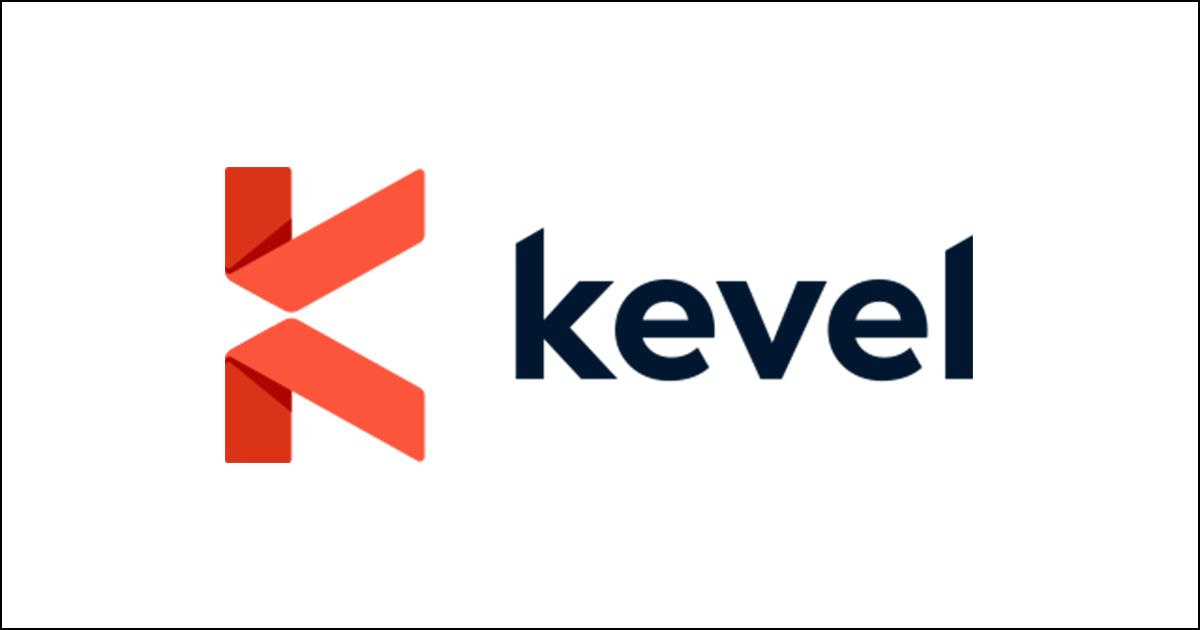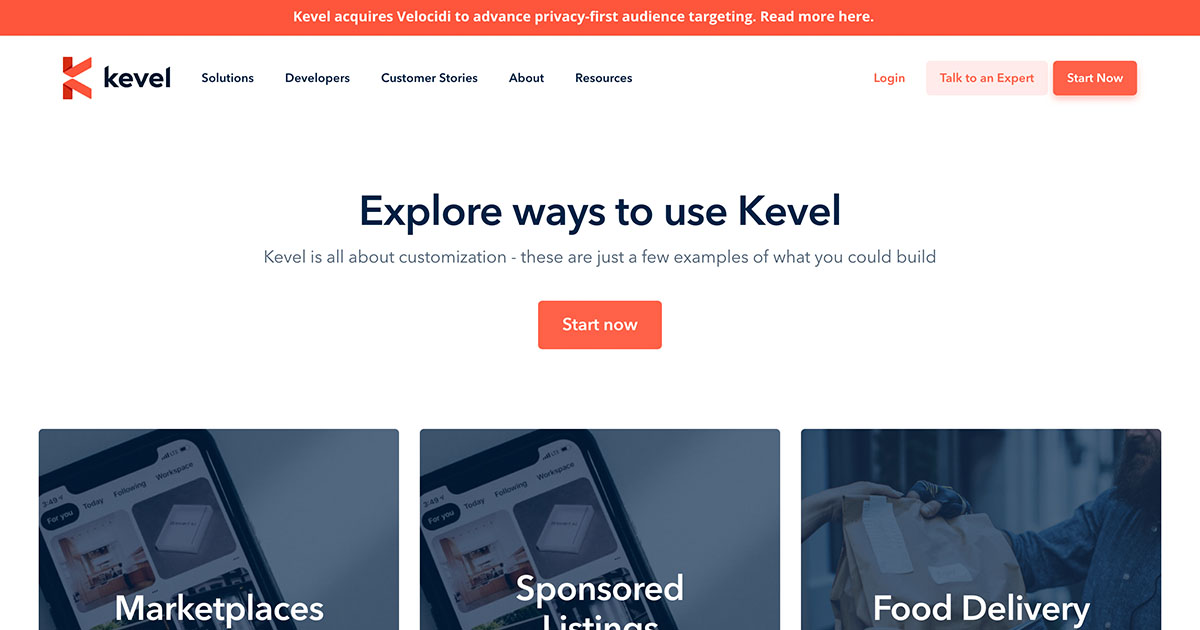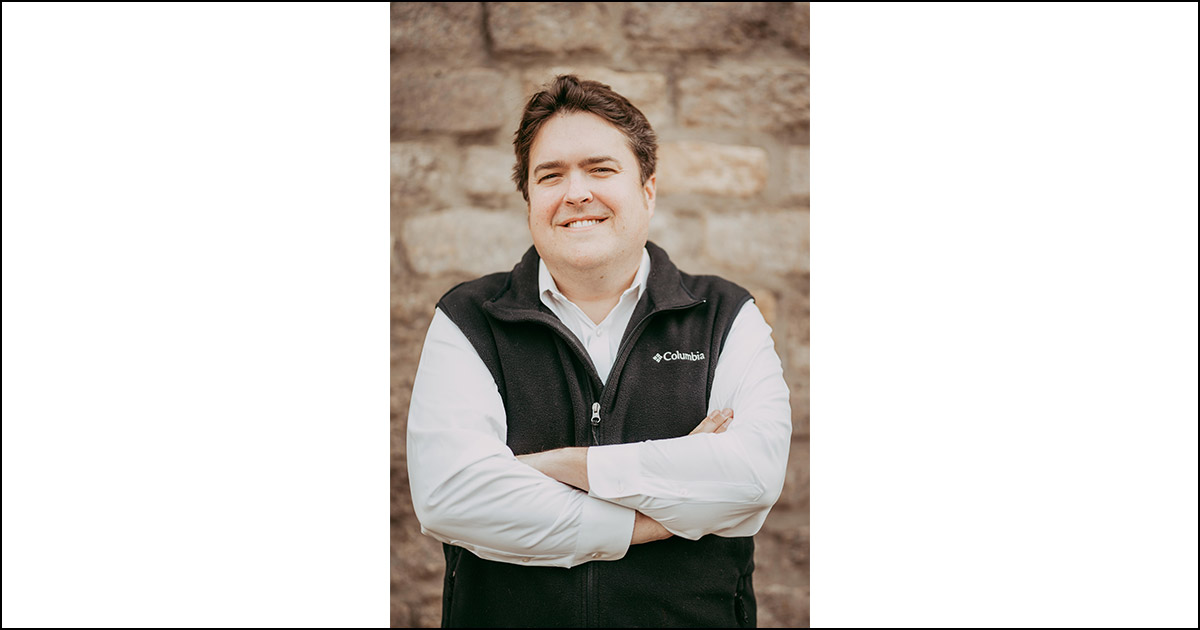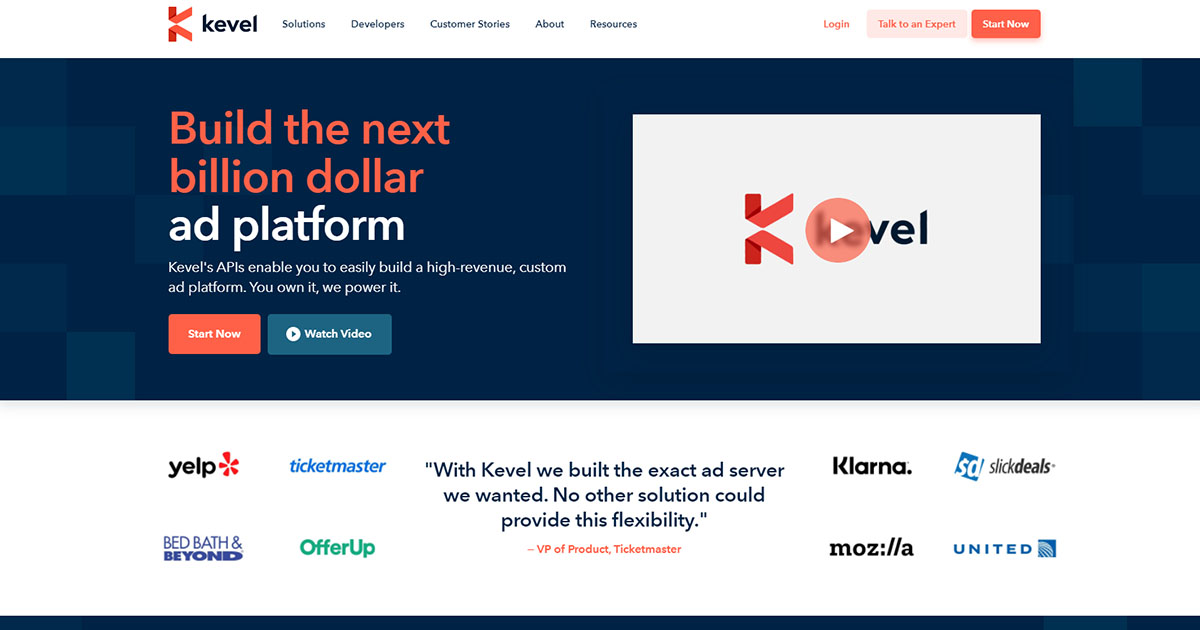Kevel Profile

Last Updated: By TRUiC Team
Kevel is an adtech startup that creates custom ad platforms for companies looking to launch impactful ad campaigns.
Interview With James Avery
Describe your product or service:
“Kevel offers the infrastructure APIs needed to quickly build custom ad platforms for sponsored listings, internal promotions, native ads, and more — allowing brands to drive new revenue in a user-first way. Customers like Ticketmaster, Yelp, Strava, Klarna, and many more have already launched successful ad platforms using Kevel.”
Describe your company values and mission:
“Kevel is committed to the vision that every online retailer and publisher should be able to add privacy-focused ad revenue streams and take back the Internet from Google, Amazon, Facebook, and other digital monopolies.”
How are you funded? I.e. type of funding, number of funding rounds, total funding amount.
“Kevel most recently raised $10 million in Series B funding, led by Fulcrum Equity Partners. This brings the company’s total amount of funding to $22 million.”
How big is your team? Tell us a little about them (I.e. co-founders, freelancers, etc.)
“Our team is made up of about 85 people, and they are mostly working remote. 20 of them are in the UK, and the rest of them are spread across the United States with a larger concentration in California and North Carolina.”
How did you come up with and validate your startup idea? Tell us the story!
“I founded Adzerk in 2010 after I realized there was a gap in the market for better tech when managing network ads. We initially launched as a JavaScript-based standard ad server but then quickly realized that server-side API ads are the future of the internet. Since then, we have evolved to offer not just an API ad server but infrastructure tools for companies to build their own ad products. In December 2020, we rebranded to Kevel and continue to develop our suite of APIs aimed at helping drive revenue and take back the Internet from big tech monopolies.”
How did you come up with your startup's name? Did you have other names you considered?
“With ‘ad’ in the name Adzerk, it made us sound like an ad network, which we have evolved far beyond. Many people were assuming that we were an ad network instead of a suite of APIs. We changed to Kevel, as it gave us a blank slate so we could start fresh and be anything we want to be.
Kevel also checked some technical boxes: easy to spell and pronounce, no chance of mis-capitalization (like ‘AdZerk’), and only five letters long. The only issue was that the dot com was unavailable, so we were forced to rebrand with ‘kevel.co’. (Fortunately, we were able to buy the dot com about six months later).”
"I now try to view each setback as a learning opportunity that will set me on a better path in the future."
Did you always want to start your own business? What made you want to become an entrepreneur?
“Ever since I was a kid, I was always coming up with new venture ideas and turning them into businesses. Whether it was a paperboy route or lawn mowing business, I always asked myself, ‘What is missing’ or ‘How can I make it better?’ Each of these ventures gave me a taste of what it is like to run a company and taught me valuable lessons along the way. It wasn’t until high school that I started taking entrepreneurship more seriously. That is when I started a web design company, designing websites for local businesses. I continued this throughout college and then launched an independent consultancy, which I ran until founding Kevel.”
Did you encounter any roadblocks when launching your startup? If so, what were they and what did you do to solve them?
“There is no simple path to success when launching a startup, nor is there a handbook on how to do it. Especially back in 2010, there was far less information than there is today on how to fundraise and grow a company. We faced roadblocks and challenges at every step of the way, but it was especially difficult as we began fundraising. Every rejection felt super personal, but it also taught me persistence and gave me the determination to keep moving forward. I’ve learned to accept that nothing will ever be perfect, but as long as you keep moving forward, you’re doing something right.
I also look back on that time and can recognize all the mistakes I made, so I now try to view each setback as a learning opportunity that will set me on a better path in the future. I wouldn’t be where I am today without those previous obstacles that taught me many lessons.”
Feeling inspired? Learn how to launch your company with our guide on how to start a startup.
Who is your target market? How did you establish the right market for your startup?
“Our target audience is any company that wants to monetize its digital property with ads. I use ‘digital property’ because our customers use us to monetize video, podcasts, websites, mobile apps, and digital out-of-home screens (digital billboards, digital jukeboxes, etc.). Our customers also span a range of industries. We have already helped launch successful ad platforms for Ticketmaster, Yelp, Strava, Klarna, WeTransfer, and many more major players online.
Another of our target audiences is current users of the Google Ads Manager (GAM) ad server. GAM comprises over 90% of the ad server market and caters to companies who do programmatic advertising (think: terrible banner ads). There are plenty of reasons that GAM is not a sustainable solution long-term.”
What's your marketing strategy?
“Our marketing strategy is to put out great content that leads people back to Kevel. We just launched our Ad Platform Academy, which aims to give publishers guides and resources so they can successfully launch their own in-house ad businesses. This helps our current customers be successful, and future customers will see us as experts and will want to work with us.”
How did you acquire your first 100 customers?
“All 100 of our first customers were all people that found us first. They were either introduced to us through word of mouth or found us via the content we have been sharing.”
What are the key customer metrics / unit economics / KPIs you pay attention to to monitor the health of your business?
“The number one metric for us is net dollar retention. We look back at our customers from a year ago and see how much they have grown. As our customers grow, it means they are more successful, but it also means we are generating more revenue. There is a good synergy between our success and that of our customers.”
What's your favorite startup book and podcast?
“My favorite podcast is called ‘Acquired.’ It is a great technology podcast. It used to be about great companies getting acquired, but now it’s just about great companies in general. It shares a lot of great stories, and I learn a lot from each episode.
My favorite book is ‘Seven Powers’ by Hamilton W. Helmer. It is a book about business strategy, and I recommend that everyone read it.”
What is a song or artist that you listen to for motivation?
“For motivation, it definitely has to be the artist, Run the Jewels. Also any Killer Mike! He is also a part of Run the Jewels, but his solo career has some great stuff too.”
Is there a tool, app, or resource that you swear by to help run your startup?
“Honestly, probably Slack. Especially Slack Connect. It allows us to have direct and easy communication with all of our customers and to work closely with them.”
What is something that surprised you about entrepreneurship?
“The most surprising thing I’ve learned has been the importance of endurance. Having the ability to endure leads to success more than anything else. It's what allows you to be able to continue working and executing goals for years and years. It’s the perseverance to keep pushing forward.”
How do you achieve work/life balance as a founder?
“When you first launch a startup, it’s very easy to get so wrapped up in it and start to view the success of your company as a reflection of your own self-worth. You have to separate the two, as it will drive you crazy thinking that way. To support your company, you need to have time away and not get too bogged down with the day-to-day stuff. As a founder, you may forget to take vacation days, and working late hours and weekends becomes the norm. But it’s important to make time for family, friends, and even yourself. Whether that is reading, journaling, working out, and so on.”
What is a strategy you use to stay productive and focused?
“I think the biggest one is journaling. Especially in the morning, I write down my thoughts and things I know I need to do. It tends to really help me focus and narrow in on what needs to get done that day.”
Did you have to develop any habits that helped lead you to success? If so, what are they?
“As mentioned above, definitely journaling. I started a couple of years ago when the pandemic kicked off and we started working more remotely. Previously, the commute into the office allowed me the time to figure out what had to be done for the day. Without that, it was hard to get started with a focus. Waking up and journaling allows me to get into the work mindset and start the day off right.”
What was your first job and what did it teach you?
“When I was 11, I got a job as a paperboy for the Capital Gazette outside of Annapolis, Maryland. I delivered papers every day after school and first thing in the morning on Saturday and Sunday. It was a great way to learn about responsibilities at such a young age. If I was away on vacation with my family, then I was also responsible for finding someone to cover my route.
The paper also didn’t technically pay me. I paid for the papers, delivered them, and then had to collect the money from everyone on my route. If I didn’t follow through on the collection, that was money out of my pocket. I was going door to door and trying to sell and deliver papers to new customers. If I signed more customers, I made more money. I was essentially running a small company before I got into the seventh grade.”
Recommended:
- Keep up with more startup companies by visiting our list of the top startups to watch.
- Hear startup stories from real founders on the Startup Savants podcast.
- Form your own startup by reading our review of the best online incorporation services.
Tell Us Your Startup Story
Are you a startup founder and want to share your entrepreneurial journey with our readers? Click below to contact us today!
More on Kevel

Innovative Tools for Building Custom Ad Platforms
We’re going to discuss how Kevel got started, how they developed their startup, and what they have on the docket going forward into the near future.

Founder of Adtech Startup Kevel Shares Their Top Insights
James Avery, founder of ad tech startup Kevel, shared valuable insights during our interview that will inspire and motivate aspiring entrepreneurs.

Here’s How You Can Support Adtech Startup Kevel
We asked James Avery, founder of Kevel, to share the most impactful ways to support their startup, and this is what they had to say.



